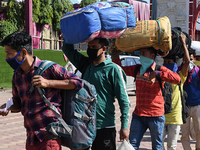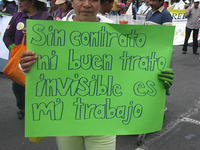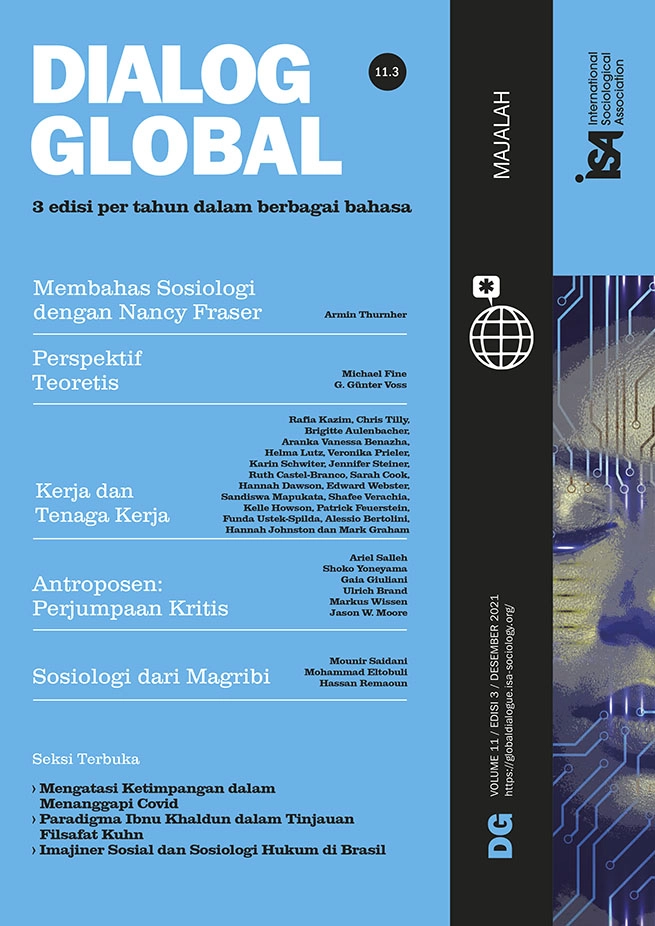The COVID-19 pandemic has led to the widespread normalization of remote working for knowledge workers, with accompanying advancements in digital tools to facilitate this transition, including communications, video conferencing, algorithmic management and task allocation, and surveillance of workers. As the pandemic has shone a spotlight on and exacerbated many pre-existing inequalities in labor markets, a marked division has become apparent between those professions easily able to transition to remote working, and lower-wage service jobs which cannot be done remotely, and in which workers have faced the dual risks of exposure to the virus, and loss of income whilst quarantining or isolating.
While these inequitable labor market stratifications - between those with the ability to work remotely, and those whose work must be performed in person - may have become starker since the beginning of the pandemic, less widely discussed has been the fact that not all remote workers enjoy relative security. In fact, the online gig economy has thrived since the emergence of COVID-19. While these forms of labor contribute to the day-to-day conveniences of many, they remain less visible.
Labor control in cloudwork
Online gig work shares defining characteristics with “geographically-tethered” gig work such as ride-hailing, food delivery, and cleaning (well-known examples being Uber, DiDi, Deliveroo). Online gig workers, or “cloudworkers” connect with clients through a platform interface, which extracts rents from transactions, and often exerts a high degree of control over the labor process. Platforms control how work is done, including through algorithmic management of task allocation, payment, and disciplinary actions. Like their counterparts in geographically-tethered work, they contractually designate workers as independent contractors or self-employed, thereby excluding them from key employment protections in most jurisdictions, such as minimum wage, sick pay, parental leave, and pensions.
However, unlike their counterparts in the taxi, delivery, and cleaning sectors, cloudwork platforms mediate work that can in theory be performed from anywhere in the world with an internet connection. They facilitate a complex web of cross-border linkages, and have been theorized to create a planetary-scale labor market. This dynamic creates novel opportunities for workers, but it also gives rise to vulnerabilities and puts workers at risk in specific ways.
First, platforms are constantly mediating relations between labor and clients in myriad jurisdictions, and this makes them difficult to capture in regulation. They own very few fixed assets, and maintain a contractual distance from their workers. This fluidity and ephemerality means they can evade local legislation designed to protect workers and the wider public, as well as tax and competition regimes.
This same dynamic serves to suppress workers’ structural power. It is especially difficult for workers to organize, build solidarities, and take collective action to improve their working conditions, when they are atomized, geographically dispersed, and cast into competition with each other by the design of the platform. It is difficult to apply national regulatory frameworks that facilitate collective bargaining to global online labor platforms. The absence of formal structures of worker and public accountability in cloudwork gives platforms enormous power to dictate terms, shape working conditions, and ultimately behave as responsibly or irresponsibly as they wish.
Most cloudwork platforms have lower barriers to entry compared to standard employment. This can provide much needed opportunities to those who have been excluded from equitable participation in labor markets - such as workers in the Global South, people (predominantly women) with higher care and household duties, migrant workers, minority ethnic communities, and workers with disabilities. However, most international cloudwork platforms enroll a significant oversupply of labor. This helps clients find workers quickly and easily, but it means job availability and wages are suppressed for workers, who are in intense and increasing competition for a limited number of jobs.
On cloudwork platforms where tasks are especially short-term, known as “microtask” platforms (like Microworkers, Amazon Mechanical Turk, and Appen), workers might be participating in larger projects to, for instance, train machine learning systems by annotating datasets. These projects are broken down into very small granular tasks which can take a matter of seconds to complete. Here, hundreds of workers from dozens of countries contribute to the completion of a project for one client, in a very short space of time. This extremely granular outsourcing can serve to obscure the conditions of labor from the end product entirely, contributing to the invisibility of cloudwork, which in turn erodes workers’ power, especially because individual workers are very easily terminated and replaced.
Because it can be very difficult for cloudworkers to exert their collective power and they are generally unprotected by national-level legislation, their quotidian working conditions remain precarious and risky. Most cloudwork platforms allow clients to reject work that might have already been completed by the worker, effectively allowing non-payment. Platforms may give workers the ability to contest rejections, but this is discretionary, often involves arduous automated processes which take more time than just completing another job, and because they have many more workers than clients, platforms commonly side with clients.
Workers on online labor platforms also face risks to their health and safety, including exposure to graphic or psychologically distressing content, as well as risks to their privacy, or inadequate data protection measures.
Finally workers are vulnerable to discrimination from clients, including discrimination based on assumptions or prejudices related to their gender, race, or geographical location.
Moves to protect cloudworkers
Risky and exploitative conditions have proliferated in remote gig work in the absence of national or international regulatory approaches capable of taming platform power, and related barriers to worker organizing and collective bargaining. As insecure workers flock to remote working and online labor platforms as a result of the COVID-19 pandemic, both grassroots labor power and policy solutions will be required to protect this class of workers. The Fairwork Project has co-produced with workers and experts a series of principles of fair cloudwork, to serve as a benchmark and a reference point for these efforts. The principles cover the dimensions of risk and harm discussed above, under the categories of Fair Pay, Fair Conditions, Fair Contracts, Fair Management, and Fair Representation. We have assessed (scored) seventeen prominent platforms against these principles, to show the range of labor practices that exist in the online gig economy. While a few platforms achieved relatively positive assessments, ultimately our research shows that in a vacuum of accountability, platforms are constantly making choices that (often negatively) affect millions of workers’ welfare and livelihoods, with a simple line of code. The first Fairwork cloudwork ratings aim to spotlight these deeply uneven power relations, and through subsequent annual scoring rounds we hope to contribute to combined efforts to introduce a fairer future of work for remote gig workers.
Kelle Howson, University of Oxford, UK <kelle.howson@oii.ox.ac.uk>
Patrick Feuerstein, Social Science Research Centre Berlin, Germany
Funda Ustek-Spilda, University of Oxford, UK
Alessio Bertolini, University of Oxford, UK
Hannah Johnston, Northeastern University, USA
Mark Graham, University of Oxford, UK




















